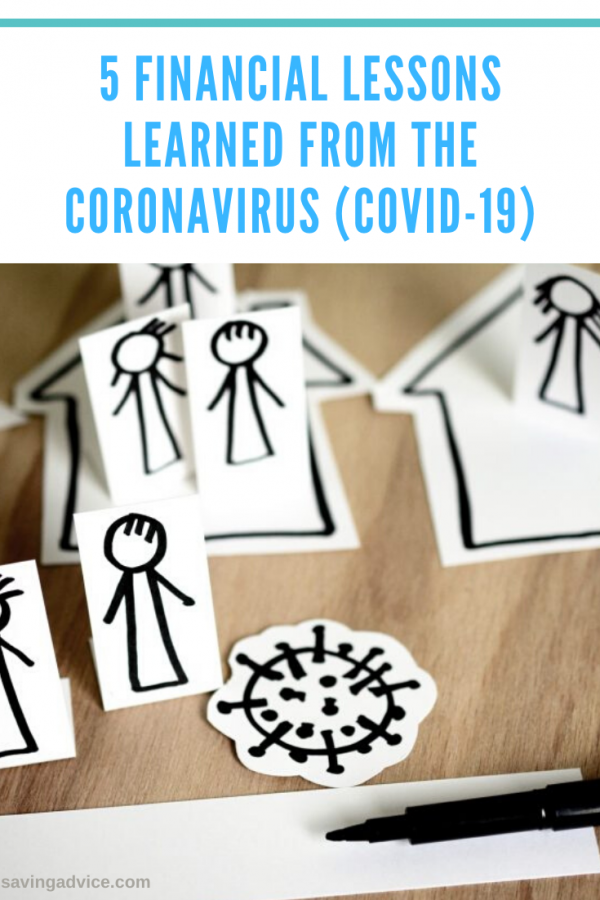
Due to the coronavirus pandemic, an estimated 30 million people are now on unemployment. Plus, many households that still have access to steady incomes are struggling, especially those where living paycheck-to-paycheck was the norm before the outbreak. Ultimately, COVID-19 has led to some painful financial lessons. However, that also means its an opportunity, a chance to learn from what’s occurred and make meaningful changes that could help in the future. With that in mind, here are five financial lessons learned from the coronavirus.
1. An Emergency Fund Makes a Difference
Having a robust emergency fund makes weathering sudden unemployment or other financial hardships significantly easier. If a household can set aside three to six months of living expenses, they have a substantial buffer that can cover gaps when income is unsteady, or they have to start relying on unemployment checks as their primary source of money.
However, even a little bit can help. For example, when people couldn’t get through to unemployment offices because of the unprecedented demand, many had access to little or no money. Even $1,000 to $2,000 in the bank could have made a difference, essentially carrying them until they were able to file their unemployment claim.
2. A Budget Is a Crucial Tool
Knowing how much you spend on a monthly basis can make adjusting to financial hardships easier. You don’t have to spend time reviewing your patterns, gathering bill data, or determining your income; that’s information you already know.
As a result, when you need to make fast changes, figuring out where to focus is simpler. You’ll have a good idea of your discretionary spending, which expenses are critical, and areas where cutting back makes sense.
3. Home-Based Side Hustles Are a Good Idea
Once shelter-in-place orders emerged, and many companies were forced to close or experienced dramatic revenue declines, it became clear how few jobs are genuinely secure. It’s a demonstration of how a seemingly reliable income source can disappear.
Not only does this highlight the need for an emergency fund, but also for alternative sources of income. Having a side hustle that can be performed from home could act as a shield, ensuring all isn’t lost if a person’s primary job evaporates.
4. Stock Market Risk is a Real Thing
For many adults who are Millennials or older, this isn’t the first dramatic downturn they’ve seen in the stock market. While watching the value of investment accounts tumble can be terrifying, it also highlights a core face about investing; the stock market is mainly about the long-term.
There have been downturns in the past, some of which were incredibly dramatic. But, over time, the markets tend to rise, “over time” being the key phrase. If you’re going to invest, you need to understand the risks associated with any stock or other investment vehicles. In many cases, if long-term growth is a goal, weathering a downturn won’t be an issue.
But, if you aren’t planning to keep that money in the market for more than a couple of years, then reexamining your portfolio and analyzing the risk is a must. That way, you can make wise choices based on the fact that your goal is relatively short-term, shielding your potential income source from the impacts of an unexpected incident such as this.
5. You Never Know When You Might Need Life Insurance
Initially, people thought that only vulnerable populations were at risk of dying from the coronavirus. However, time has shown that isn’t necessarily the case.
If you are the primary income earner or your household would struggle financially if you passed away unexpectedly, having life insurance is smart. It ensures that, if you died, they have an influx of cash that can help them handle the associated expenses and maintain their quality of life.
Ultimately, life insurance is all about preparing for the unknown. If members of your household rely on your income, it’s worth exploring, no matter your age.
Have you learned any other financial lessons because of the coronavirus pandemic? Share your thoughts in the comments below.
Read More:
- Saving Money During the Coronavirus Outbreak
- 8 Helpful Apps to Navigate the Coronavirus
- How to Pay the Bills During the Coronavirus Pandemic
If you enjoy reading our blog posts and would like to try your hand at blogging, we have good news for you; you can do exactly that on Saving Advice. Just click here to get started.
Tamila McDonald is a U.S. Army veteran with 20 years of service, including five years as a military financial advisor. After retiring from the Army, she spent eight years as an AFCPE-certified personal financial advisor for wounded warriors and their families. Now she writes about personal finance and benefits programs for numerous financial websites.
Comments